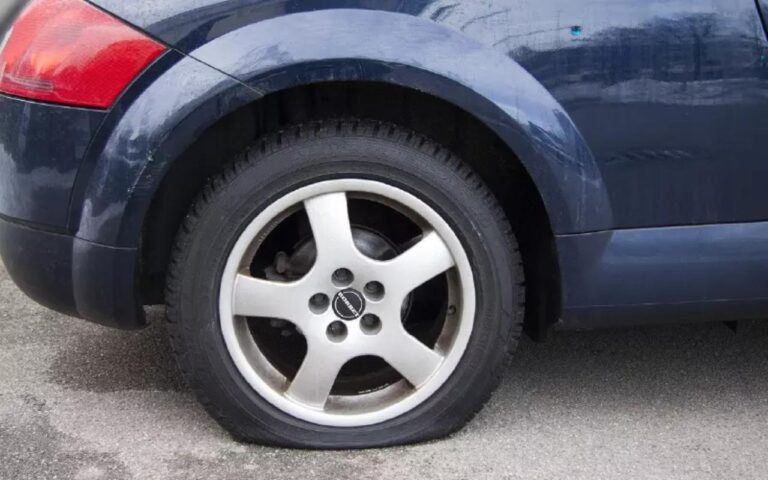It is a beautiful morning, and you are all dressed up and ready to hit the road, but the flat tire greets you as you approach your vehicle. It is not a pleasant scenario to start your day. What could be the reason for this? What causes a tire to go flat overnight?
The apparent reasons causing a flat tire in the morning include a small puncture, defective valve stem, leak around the tire bead, damaged rim, malfunctioning repair, and temperature changes.
Getting a flat tire in the morning could be real trouble as you may need to go to a repair shop first for a check-up instead of going to your actual destination.
My goal is to give you relevant information on the typical causes of a morning flat tire and tips on avoiding the situation. So, jump right in and enjoy!
What Causes a Tire to go Flat Overnight?
Tire Puncture
A small puncture on your tire caused by any sharp objects could be a reason why your tires go flat in the morning. The hole could be tiny that your tire can survive the whole day while you use it, but the air will drain overnight.
I’ve experienced this multiple times, not only on my car but also on my motorcycle tires. At first, I thought it would just go away after I refilled the tire with air, only to find out that it had gone flat again the following day.
A tire puncture is a common scenario for car owners, and sometimes, it is tough to discover the punctured area. When you suspect that your tire has a hole, the best thing to do is go to a repair shop and have a mechanic check it.
Defective Valve Step
The valve stem is where you pump air into the tire to inflate it. In the same manner, this is also where air typically comes out if it malfunctions or if it suffered some damage during tire repairs or when filling air into the tire.
Corrosion, physical damage, or loss of contact are common reasons for a leaking valve stem. Overtightening the valve seal and automated car wash can also potentially damage the valve stem.
Sometimes it isn’t easy to know if the valve stem is leaking, but you can use water with soap and pour it on the valve and observe if it will create some bubbles. If bubbles occur, it means that the air is coming out of the tire.
Leak Around the Tire Bead
Road salt helps control ice and snow and can keep you safe during the winter. However, the same could cause corrosion around the bead area of the rim, creating micro air leakage that can cause your tire to go flat overnight.
Hitting a curb or a large pothole could also potentially create scratches or what is commonly known as a curb rash or simply the damage your tires suffer after the incident. A slight scratch on the rim around the tire bead area could build up as a corrosion issue when exposed to the road chemicals you encounter when driving.
Then, the result is a slow leak around this area. Fix-a-flat can usually help temporarily fix slow leaks on the bead area as it does on the tread area. However, the best solution is to permanently fix the problem to avoid the issue from happening again.
Damaged Rim
I think you already learned how a rim could potentially get damage from the section above. Road salt causing corrosion or curb rash would likely happen to your rims and create slow leaks to get your tire flat in the morning.
Apart from these causes, there could be other possibilities that would rim damage like vandalism or your rim getting hit by a sharp object or stone. The latter typically happens when you love the outdoors and enjoy off-road adventures.
The rim could also get damaged when mounting a new tire, especially if you do not hire a professional mechanic to install the tire safely.
Repair Malfunction
When our tires get some repairable damage, we always bring them to a repair shop to fix the damage. We do this for an economic reason – it is more expensive to purchase a new tire than get your existing tire fixed.
The permanent fix for a tire hole or puncture involves curing the rubber to seal the wound on the tire. However, on some occasions, the repaired area of the tire will fail, leading to the recurrence of the problem.
Excessively High Temperature
Changes in the temperature could also potentially cause a tire to go flat overnight.
Excessively high temperatures could increase the air pressure inside the tire. The air inside the tire would find some way to get out of the tire either by finding a crack, tiny punctures that don’t show during average temperature, or around the tire bead.
The worse thing that could happen is your tire would explode. If the temperature is high, it is ideal not to overinflate your tires. Overinflation could potentially cause your tire to break. The typical tire pressure is between 32 to 35 psi, but checking your vehicle’s manual to find out the correct tire pressure is the best thing to do.
Most vehicles also feature a Tire Pressure Monitoring System (TPMS), which gives you details on your dashboard to ensure that your tires have the correct pressure level.
RELATED: Achilles ATR Sport Review
A freezing temperature could also potentially cause your tire to go flat overnight. Jump in the next section to know how it happens.
Can a Cold Weather Cause a Tire to Go Flat Overnight?
As mentioned above, a cold temperature could be a potential reason for your tire to go flat when you check it in the morning. Now, how does it happen, or why does it happen?
The reason why your tire could sometimes appear flat in the morning after a freezing night is the contraction of the air. You probably won’t remember anymore, but your science teacher taught you that the air molecules contract in cold temperatures.
The pressure of the air inside your tire drops when the temperature of the air outside the tire decreases. Your tire may not go totally flat, but it sure would give you a noticeable tire pressure imbalance. You should add more air pressure during cold weather.
The trick is to monitor the tire pressure information on your dashboard constantly.
Will a Tire Go Flat Without a Cap?
Losing or not putting the cap of your tire’s valve does not immediately affect your tire to cause it to go flat. You could attest to this fact if you have been driving for years.
When you install new tires, the mechanic would always put the valve cap on. Why would they do it if it does not cause a tire to go flat? As I mentioned, it has no immediate effect. However, exposing the tire valve could lead to an issue that would result in a flat tire.
When the tire valve is exposed, dirt and road salts could potentially trigger corrosion that would ultimately cause damage that would result in air leakage.
The valve cap has a purpose: to protect your tire valve and avoid possible damage that would lead to another problem. It does not necessarily cause a flat tire, but the damage to your tire valve would. Therefore, I would still highly recommend that you install the cap.
Road vibrations could potentially unscrew your tire’s valve stem cap. If you happen to lose it, you can go to any tire or auto shop and get a replacement.
How to Prevent a Tire from Going Flat Overnight
Your tire goes flat overnight because something is causing it. It could be a slow leak around on the tread area, on the sidewall, around the bead, or the valve stem. It could also be just the cold temperature causing the tire to lose some pressure.
To prevent it from happening again, the best thing to do is go to a mechanic and have your tire checked for any possible issues. Otherwise, if you keep refilling the tire, it will continue to give you a flat tire in the morning.
The culprit of the flat tire needs proper diagnosis. You need to discover the actual issue. If you want to diagnose it yourself, you can fully submerge the entire tire into a large basin filled with water and soap. This technique will show the affected area as the air escaping from the tire would create some bubbles.
When you know your tire is damaged, don’t waste time. Go to your nearest local shop to get it fixed.
Conclusion
Multiple reasons can cause a tire to go flat overnight, including a puncture, valve stem leak, and bead leak. Another possible reason that could contribute to the loss of pressure on your tire is the cold weather.
When your tire goes flat overnight, there is an underlying problem that you need to discover. When you find out what the culprit is, immediately get it fixed so that you will not experience another instance of a morning flat tire.

